Ljubljana related
STA, 26 November 2018 - Port operator Luka Koper reported on Monday a nine-month net profit of EUR 49m, which is a 22% improvement on the same period last year. Net sales revenue was up 6% to EUR 168m.
Excluding the EUR 9.1m compensation received over damage to a bridge crane caused by a ship during a storm, the January - September 2018 net profit would amount to EUR 40.9m, a 3% year-on-year improvement, the company pointed out.
The group's operating profit (EBIT) rose by 29% to EUR 57m or by 8% to EUR 47.4m when discounting the mentioned one off event.
The core company recorded EUR 165.5m in revenue, a 7% increase, net profit rose by 22% to EUR 47.7m, EBIT by 30% to EUR 55.8m and EBITDA by 22% to EUR 77.2m.
Transshipment in the port was just under 18 million tonnes, which is on par with the first nine months of last year. March saw a monthly record of 2.3 million tonnes.
Luka Koper had a workforce of 1,217 at the end of September, a 11% increase on a year earlier.
It spent EUR 9.5m on investment at the level of the group.
All our stories on Luka Koper port are here
STA, 19 November 2018 - Foreign Minister Miro Cerer criticised on Monday "immature acts" on the part of Slovenia as a reason for Hungary deciding to pull out of the Koper-Divača rail expansion, saying "Slovenia has missed a unique historic opportunity to the detriment of future generations".
The former prime minister, whose government was in talks with Hungary to take part in this major infrastructure project, believes such treatment of strategic partners does not bode well for Slovenia.
Speaking to the press after an EU ministerial in Brussels, Cerar regretted that as he meets his Hungarian counterpart Péter Szijjártó in Ljubljana on Tuesday, they would probably not discuss "further strategic cooperation on the second rail towards the port of Koper".
Despite his government's major effort to get Hungary on board for strategic partnership on this important transport route, Cerar regretted that "a unique historic opportunity has been lost to the detriment of future generations".
"In my view, this is a big defeat for Slovenia," said Cerar, stressing that Hungary had been willing to cooperate for the past three years, but had been driven away by "immature acts" on the Slovenian side.
Infrastructure Minister Alenka Bratušek referred to, but not named
He regretted "completely inappropriate, politically immature statements saying that we will dictate to Hungary the conditions for cooperation". This is in reference to Infrastructure Minister Alenka Bratušek's statements, whom he did not explicitly mention. [More on that story here]
He said that such statements "mean a total lack of understanding of cooperation among countries at high political level", and added that it remained to be proved that the project would be more expensive with Hungary taking part.
He also warned the EUR 200 million that would have been contributed by Hungary would have to come from other sources - from loans or the state budget, which means there will be less money for other projects.
"Those who have caused this situation will have to find an answer to it. They will also have to say where we'll get the money and how we'll treat strategic partners in the future," Cerar said.
Similarly, Defence Minister Karl Erjavec, who is also in Brussels for an EU ministerial, regretted Hungary's withdrawal, pointing to the financial aspect.
"If we look at how difficult it is to draft a supplementary budget for 2019, every cent coming into the country is welcome," said Erjavec, the foreign minister in Cerar's 2014-2018 government.
"Talks with the Hungarian side had been under way. Since the minister [Bratušek] disclosed how they proceeded, Hungary obviously withdrew," said Erjavec, who hopes this is not its final decision.
On Friday, Hungarian Prime Minister Viktor Orbán said the idea under which Hungary would take part in the construction of a new railway line between Koper and the inland hub of Divača had been dropped. He also said the country had already started talks with the port of Trieste in Italy, located some 15 km north of Kop
All of our stories about Slovenia and Hungary can be found here
STA, 19 November - Infrastructure Minister Alenka Bratušek appears unperturbed that Hungarian Prime Minister Viktor Orban decided to withdraw from the Koper-Divača rail project. She said on Monday that Hungary was interested in the project to get a piece of the Slovenian coast and that that would never have happened.
Bratušek said on Saturday, when the news about Orban's decision broke, that she had wanted to propose to the government to implement the major infrastructure project on its own anyway, but that she had been waiting for certain figures.
Speaking to the press today, the minister said that she had known for at least a month that the project would have a lower price tag without Hungary's involvement, but at the moment she was still uncertain by how much.
Under the previous government's plans, Hungary would invest EUR 200m in the EUR 1bn project seen as vital for the development of Slovenia's sole maritime port in Koper, but Bratušek has calculated since taking over as the minister that the project would be cheaper if Slovenia went at it alone.
"Hungary was promised certain returns as well as 50,000 square metres of land in long-term lease," she said today and added that "personally, I would have never proposed to the government to back Hungary's involvement under the conditions it had set".
The law governing the management of the rail project was adopted some time ago and has survived two referendums, but there are still several open issues. "The investment plan has not been hammered out to the point where the government could discuss it," Bratušek said.
Bratušek: Hungary focused on the Slovenian Sea
The minister believes that Hungary would have set additional terms for its collaboration: "Hungary is more interested in the Slovenian sea, a gateway into the world, than in the Divača-Koper project."
According to her, Orban explained his decision by saying that Hungary would get a bigger stake, potentially even a majority stake, in the port of Trieste. However, Bratušek would not allow "a single centimetre of the port of Koper to end in foreign hands" as long as she is minister.
"If this is the reason that [Hungary] will not be involved, then be it," she added and reiterated that Slovenia was able to build the second rail track connecting the Koper port and the inland hub in Divača on its own.
All of our stories about Slovenia and Hungary can be found here
STA, 19 November 2018 - Boris Popovič, who has had a comfortable tenure in the Koper mayoral office since 2002, will have to put in additional effort to convince the residents of the largest coastal municipality. In a tight race, his main challenger Aleš Bržan, an independent, managed to force a run-off.
After nearly all the votes were counted, Popovič's support stood at 44.5%, whereas Bržan was backed by 30.5% of those who turned out.
After the polls closed, Popovič said he hoped to be elected in the first round. "I believe we did a whole lot. We couldn't have done more. We worked day and night for four years on 12 years of foundation. I believe we deserve to get another four years."
Nevertheless, the mayor was not overly disappointed, because "it was virtually impossible to win in the first round with 13 candidates" running for the office.
Looking ahead, he said that the campaign for the run-off would finally provide the two candidates with the chance to compare their platforms.
"We will do our job ... until the end and let the people decide as they want," he said and added that "even if people are annoyed and think that another candidate can give them more, stimulate better development, why not".
Popovič's popularity appears to be waning, with Bržan gradually eating away at his voter base. In 2014, Popovič cruised to victory in the first round with almost 53% of the vote and Bržan, then backed by the Modern Centre Party (SMC) got 25%.
Bržan told the public broadcaster TV Slovenija that his team had been working hard for this and that they would continue to give it everything so that things would change in Koper.
"It is obvious that something has happened in Koper, and we hope that this will be a turnaround in the way the municipality is run," he told the STA.
Popovič, known for his authoritarian style and disdain for even moderate criticism, has been losing his grip of Koper as voices have started to grow louder about the need for more democracy in running the city.
Antiša Korljan, the editor-in-chief of the Primorske Novice newspaper, says that the apparent second round is the result of votes against Popovič.
Bržan is a reserved, cultivated and deliberate candidate, but this is not necessarily a good thing, he added. "Bržan will have to become a bit more aggressive in his approach, he was lacking that in his communication," Korljan said.
Despite the challenge Koper voters have thrown at Popovič, he managed to retain his power in the city council, where he will have 13 councillors in the 30-member body, the same number as before.
Bržan will have nine councillors; in the previous election he ran with the support of the Modern Centre Party (SMC), which had won seven seats but was relegated from the council this time, winning less than 2% of the vote.
Olive, a local party, and the Left won two seats each, with four more parties and lists having one seat each, including the list of Popovič's former close ally Gašpar Gašpar Mišič, who is now one of his biggest critics.
All our stories on Koper are here
STA, 14 November 2018 - Boris Popovič, the controversial mayor of Koper, appears to be the favourite to win his fifth term, and not even more than 40 court proceedings and costly "decorative lighting" set up just before the election seem to be eroding his voter base in the largest coastal municipality.
Popovič has for years been accused of arrogance and disregard for rules, but no challenger has so far succeed in dethroning the mayor who has been leading the fifth largest city in the country since 2002.
This year, he faces a dozen challengers who have mostly called for more democracy in Koper. The mayor appears unfazed, dismissing criticism and doling out campaign treats to his voters.
Christmas lights turned on November 9th
In what his opponents decried as shameless self-promotion and abuse of public funds, Popovič decided to introduce a novel approach to Christmas lighting in the city this year.
Dubbing it decorative lighting to bypass rules that prevent cities from turning into winter fairy tales before 1 December, Popovič turned on the EUR 500,000 lighting, called Wonderland, on 9 November, less than two weeks before the election.
He argues that Wonderland, which has been described by many as a kitschy destruction of the historic character of the city, will attract people from all over Slovenia and from abroad and thus boost revenue from tourism.
The decision is not unusual given Popovič's 16-year record as mayor, which has been punctuated by disputes over aesthetics as much as by his run-ins with the law which landed him in court in dozens of cases.
Some cases are still pending, but most have turned out in his favour. He was sentenced to three years in prison in 2014 for abuse of office in the sale of municipal land, but a higher court annulled the ruling and ordered a retrial. The case has since become statute barred.
In 2009, Popovič got a three-month suspended sentence for defaming a reporter, in 2010 a suspended sentence of a year and ten months for abuse of office, tax evasion and doctoring business documents, and in 2012 a two-month suspended sentence for defamation.
But this has not shaken his foothold in Koper, nor has it provided his opposition with enough ammunition. This has also been reflected in the campaign, which has been fairly mellow, the glittery Wonderland excluded, before the final week of the campaign.
A number of suspicious incidents around the campaign
Only days before the election suspicions were raised that unauthorised people were able to access data about the support of voters to individual candidates.
Additionally, a man from Koper whose company does business with the municipality said he had received a call from the incumbent's campaign office quizzing him about his relative's candidacy on another candidate's list.
"I perceived this as a threat to my business, meaning that if I don't settle this, I'll lose the deal," the man, who said he had evidence of the phone call, told the public broadcaster TV Slovenija.
There was another minor incident, as posters of Popovič's former ally and advisor Gašpar Gašpar Mišič were removed from several bus stops by the city's utility Marjetica.
Officially, the posters were taken down because of the damage caused to the stands by the recent storm, but Mišič pointed his finger at the mayor, labelling the move campaign mischief.
Overall, Radio Koper editor-in-chief Andrej Šavko believes that the campaign has been quiet because "candidates, their campaigns and their supporters are engaged in the field instead of in the media", which is customary for local elections.
All 13 hopefuls faced off in a single debate at which "none of the candidates stood out in a positive or negative way", he told the STA.
While Popovič faces a dozen opponents, Aleš Bržan, an independent who ran for mayor on the slate of the Modern Centre Party (SMC) in 2014, is considered his most serious rival, though he is still a long shot for the mayorship.
You can find all our stories on the local elections here
Some weeks ago I was at one of the Pivo & Burger Fests in Ljubljana, researching Slovenia’s flourishing craft beer scene. Six months earlier I’d paused my investigations, overwhelmed by the number of breweries and beers that were turning up on my radar each month, anxious to reduce my drinking (and spending), and – to be frank – bored of IPAs.
Learn more about Slovenian craft beer here
It was thus with delight that I found a much evolved selection of beers at the festival, with a broader range on offer, including wheat beer, lager, porter, gose and, my new obsession, sour (and Bevog’s Lolita in particular). But beer wasn’t my only discovery that long and hazy weekend, as I also came across a stall offering samples of chili sauce – another market that’s seen a boom in Slovenian producers in recent years – and one these, the fiery but flavourful All Stars had an effect I can only describe as making me high.
A disclaimer on personal taste: I like hot food, with a preference for Indian, Sichuan and Thai, but I don’t like pure heat. Instead I crave a more rounded flavour, with bass notes to accompany the highs. I also have, like everyone else, a level of heat that tickles my brain in just the right way, just on the right side of pain to release the endorphins and have me putting down the fork, spoon or chopsticks and taking a little time out to enjoy the waves of pleasure and distress, before diving back in again and feeling the heat.
It was this level that Gorki’s All Stars hit, and I went back a couple of times to just try another dab on a breadstick, each time getting that same rush and happy high that left me smiling like a loon. I bought a bottle on the spot, and a gift pack of samples of their other sauces, and a bag of dark chili chocolates that, like the sauce, had a balance of flavours that went just far enough out of my comfort zone to flood me with joy, and that I finished the next morning with coffee.
I got talking to the two guys who run the company, Igor and Rok, learned that they produced everything in Koper, had won a big hot sauce competition in America, and were willing to give me an interview, as follows:
How did you start with chili farming?
We started four years ago, first as a hobby, simply because we love spicy food. We started with a few plants that we grew at home. Rok made a hot sauce out of the first chilies he grew and all our friends and family were enthusiastic about it. With their support we decided to grow more plants - a lot more – make more hot sauces and try to put them on the market. In the first place because the Slovenian market at that time didn't offer a lot of hot sauces or other chili products. And those few on the shelves weren't “the real thing”, in my opinion.
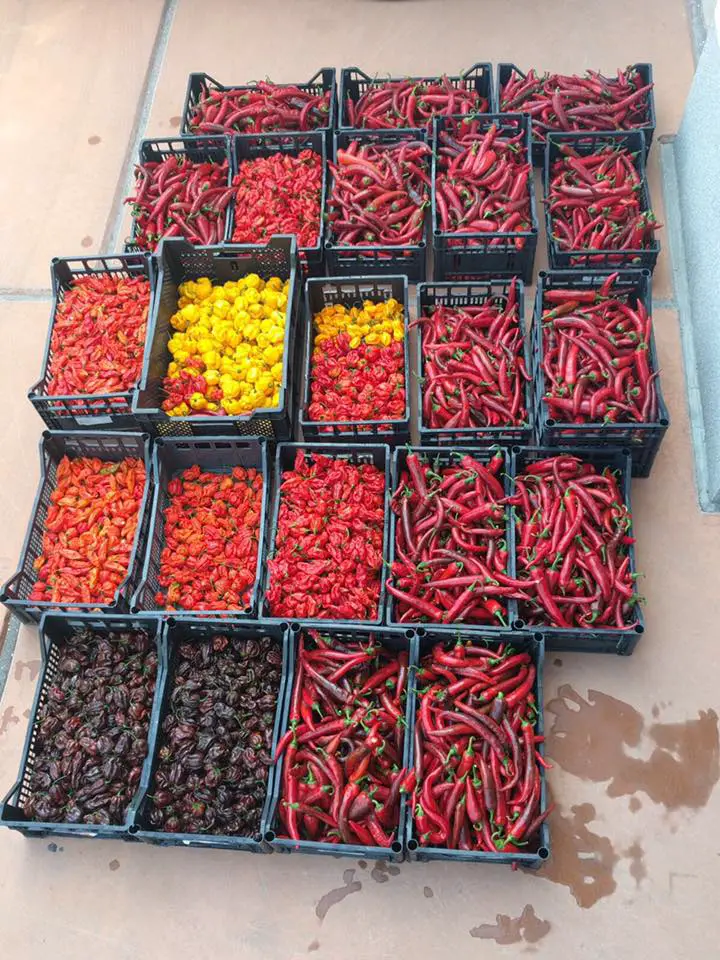
What problems did you face when starting your business, and how did you overcome them?
We were new to the business and there were really a lot of things to think about – taking care of the plants, cooking the sauces, creating our webstore, packaging, storage, creating a label … Somehow we managed to solve all those with good organizing and planning of the work.
Then in the fall 2014 we first created three hot sauces with different degrees of heat and started selling them through our webstore. By spring they were all gone, which was a really good start.
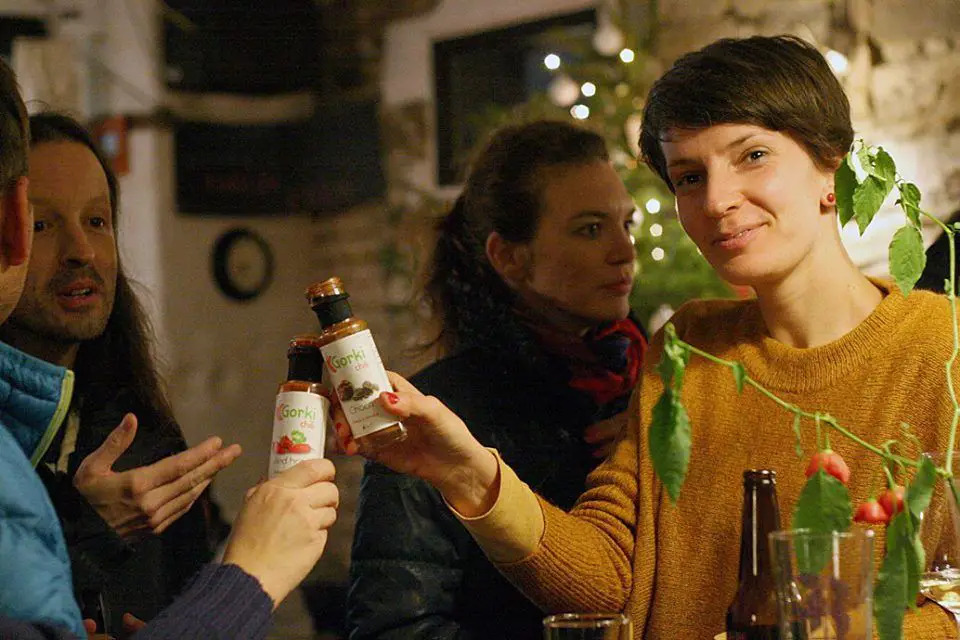
Two of your sauces came second and third at the 2017 World Hot Sauce Awards. Can you tell me a little about that.
We first entered the World Hot Sauce Awards competition in 2015. Back then our hot sauce Choco came third in the Latin style category. For us it was a clear sign that we were on the right track. A year after our hottest sauce, All Stars, came second and last year it was third. It’s an extra hot sauce, but besides that it tastes really good. We believe our products are special because we always put taste in the first place, rather than the heat. We choose the ingredients very carefully, we try to be creative when cooking and do as much testing as needed in order to achieve the right flavor. All this we believe is the key to quality.
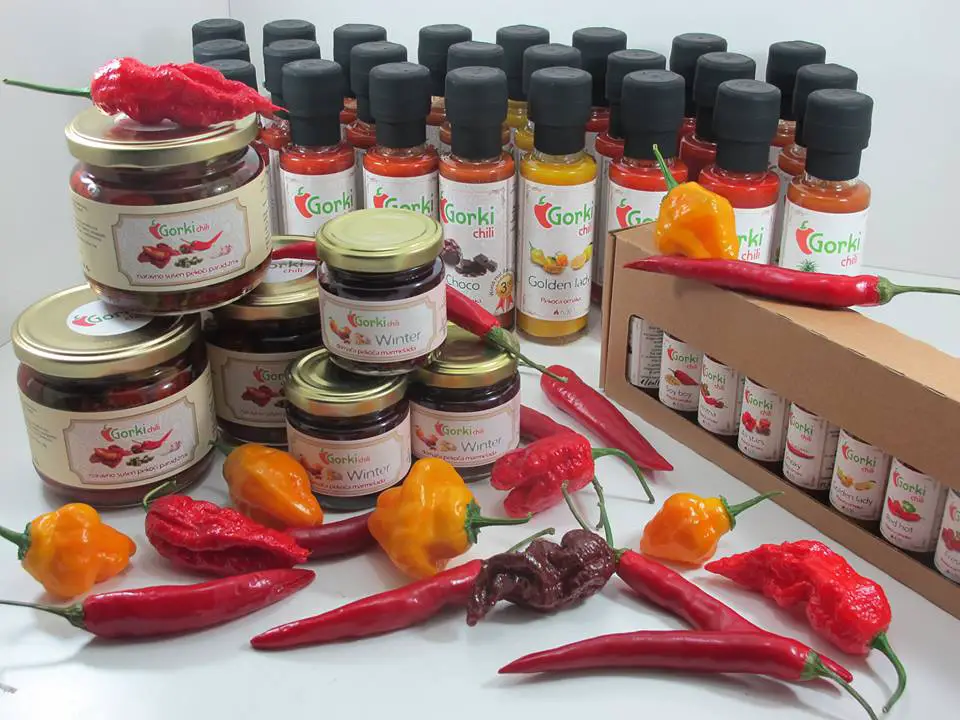
Which of your sauces do you enjoy the most?
It's very hard to answer this question. You know – it's like when a father is asked which child is his favourite. To us all of them are delicious, each in its own way, suitable for a different dish or for a different kind of chili lover, from beginners to real chiliheads.
That’s what keeps this exiting, not the one “best” sauce, but searching for new tastes, creating new products, meeting new people, having face to face contacts with our customers at fairs and festivals, where we can give them advice and have interesting debates about chilies.
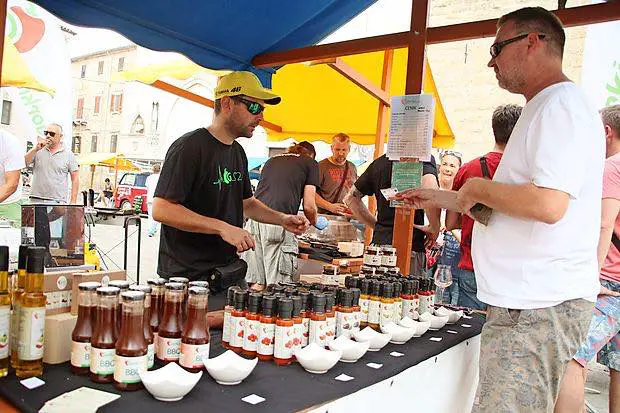
What are some of the other chili products you sell, beyond the sauces?
Hot paradajz is one of our bestsellers that also requires a lot of time to prepare, because it's all handmade. It consists of spicy dried tomatoes in extra virgin olive oil with garlic, capers and spices. Once you try it you can't live without it, really. We also make two types of BBQ sauce, hot marmalade, spicy chocolate, and spicy extra virgin olive oil which was named world champion at last year’s World Hot Sauce Awards.
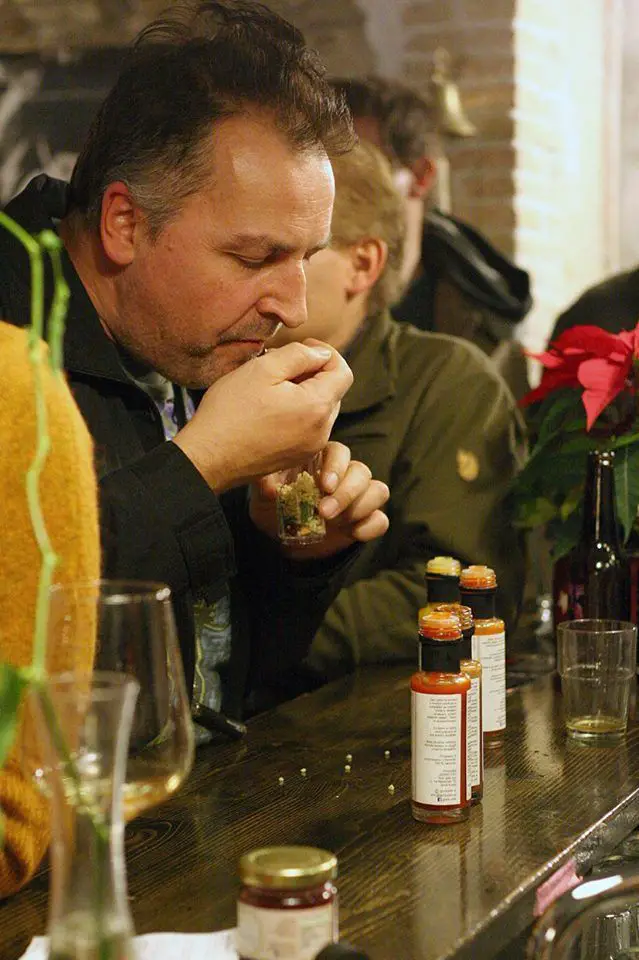
What are your plans now?
We plan to start selling our products on foreign markets, and of course keep on developing new ones. But for the moment everything is available in Spar and InterSpar all over Slovenia, in some small gourmet stores, and of course in our webstore. We also supply a lot of restaurants and pizza places with our sauces.
Anything else you’d like to say?
Yes, our philosophy in growing chilies and producing hot sauces has two main goals: quality and taste. Of course we want our hot sauces to be hot, but the flavour is always number one. We are happiest when our customers tell us that they enjoyed our products not because they taste like fire, but because they’re delicious.

You can find Gorki products in stores, at markets, and online, with the official website here (in Slovene, English and Italian), and note the neither TSN nor myself received any compensation for this article, just a few samples at that beer festival which were enough to turn me on to this story.
Get to Know the 17 Historical Towns of Slovenia
There are many ways to plan a trip around Slovenia and lenses through which to view it, and one way to explore the country is through its historic towns. But how to choose these in a land that’s got so many? One way is by turning to the work of the Association of Historical Towns (and Cities) of Slovenia (Združenje zgodovinskih mest Slovenije), a group that includes 17 mostly medieval towns sited around the country, each of which has its own story to tell, with the full list being Idrija, Jesenice, Kamnik, Koper, Kostanjevica na Krki, Kranj, Metlika, Novo mesto, Piran, Ptuj, Radovljica, Slovenske Konjice, Škofja Loka, Tržič, and Žužemberk.
STA, 16 October - Tomos, the Koper-based manufacturer of the internationally-renowned moped brand, is looking for a strategic partner to help it deal with liquidity issues.
STA, 24 September 2018 - More than 70 foreigners were apprehended after illegally crossing the border in the Koper area in the west this weekend and another 36 in the Novo Mesto area in the south-east. There are currently 266 asylum seekers in the country, according to official statistics.
STA, 19 September 2018 - The operator of Slovenia's sole maritime port will employ 307 workers currently sourced out through subcontractors, plus an additional 350 agency workers.




